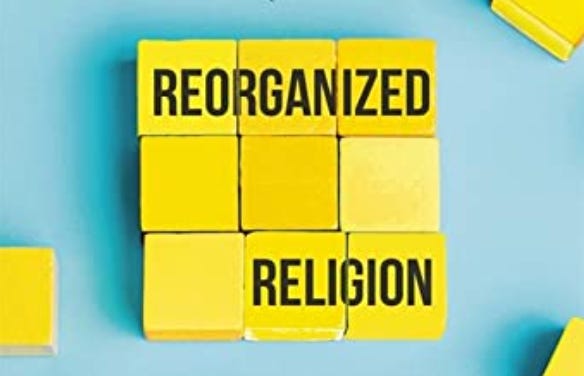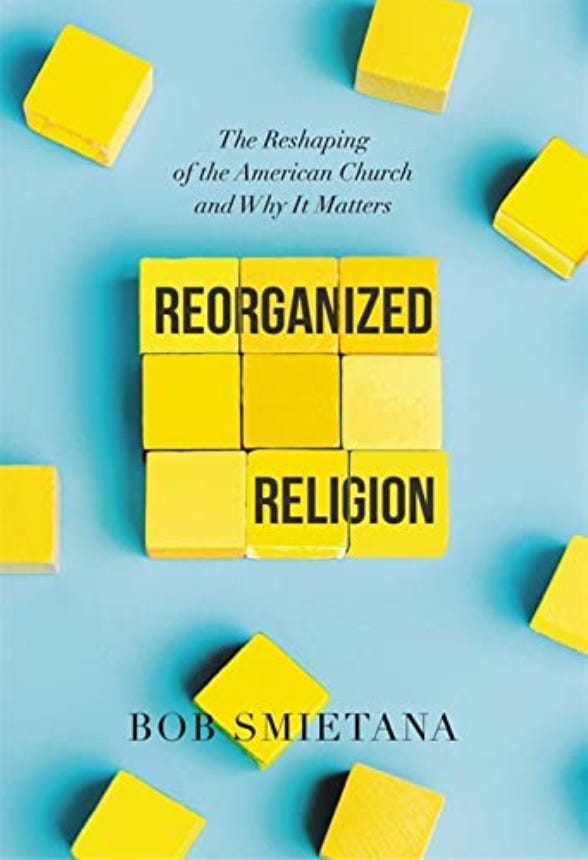The Challenge for Organized Disbelief
About the future church, the road is “bumpy” but there’s no prepared path for that future. We return to Bob Smietana’s excellent new book, Reorganized Religion: The Reshaping of the American Church and Why It Matters, a must read for all church leaders. The way forward is “stable but precarious.”
At one point in Bob’s book he turns to the Faith Communities Today survey (FACT), which studied congregational life, not the faith life of individuals. Congregations form the foundation and the future for the church.
The average church is shrinking fast. 20 years ago the median was 137 people; today it is 65. Median-sized churches are going the way of buttoned shoes. Put more starkly, half the congregations in America are in danger. What is needed for this are innovation and adaptation.
The Nones are an important factor: “organized religion without the God bits” as Pippa Evans, one of the founders of the atheist Sunday Assembly movement, which is in decline already. In Bob’s conversation with Ryan Burge, Burge observed that the Nones don’t organize. Is it disorganized religion, or organized disbelief? “As organized religion declines, people are becoming less religious and less connected at the same time.” This trend echoes the social trend of Robert Putnam’s famous “bowling alone” theory: the decline appears in social capital as well.
The Nones are not connected: some are atheists (4% of USA); agnostics (5%); nothing in particular (no number). Using another profile, Smietana turns to compare non-religionists and secularists, the former as civic dropouts with interest in neither religion or politics and the latter as ones with deep interest in civic engagement. They are not organized.
Religion creates social capital and engagement and networking. Social media, which is characteristic of the secularists, is not good at building social capital but it does get people to do something in the short term. Their form of social engagement tends to be engagement in politics. He takes a look at the well-known atheist, Hermant Mehta, who more readily these days identifies as a secularist, which puts him in touch more with the Nones. Mehta is not in favor of imitating churches in secular Sunday events but instead of cooperating with others for the common good.
Interesting study by David Speed showed that Christians have a much more negative perception of atheists than atheists have of Christians. Atheists tend to look at others in radically equal ways. Two recent studies show that atheists and religious people have “similar health outcomes,” and that having life principles and a solid social network contribute to health quotients. The believe-nothings have lower health ratings.
Since social networks shape health the secularists are challenged to find social relations.
Most religious groups not only have a strong, charismatic leader, their religion is anchored in an originating strong leader. That is a Messiah. But secularist organizations thrive on voluntary efforts and cooperative actions instead of imitating churches with their strong charismatic leaders.
Church is a social experience and has always fulfilled the social needs of people. While church can’t be reduced to the social, because after all it’s about God and worship and the transcendent, the social matters. People don’t need a church to satisfy their social needs but what the church does provide at the social level is harder to achieve for the non-churched, Nones and secularists.




Hi Scot, your paragraph from your article, sums up the lament that has plagued my soul from an Australian church perspective:
“Most religious groups not only have a strong, charismatic leader, their religion is anchored in an originating strong leader. That is a Messiah.But secularist organizations thrive on voluntary efforts and cooperative actions instead of imitating churches with their strong charismatic leaders.”
I discussed this very point with my mentor earlier this year. We mused and lamented over the stories of abuse that come out of Willow Creek, the cover up of abuse at Hillsong, as well as our childhood denomination, and we couldn’t help but think the wider Western church had been sucker punched. The celebrity and Messiah complex leadership that has plagued much of Western Christianity, has not only enabled toxicity and abuse, it has caused denominations like the one I came to Jesus in, to lose touch with what made them unique and a move for God to begin with. Not only that, this kind of leadership while it looks attractive, it ends up chasing volunteers away.
The Australian church, even though Hillsong comes from here, is by and large influenced by what happens in the church in the US. Christian A. Schwarz highlights through his work with Natural Church Development, churches with an empowering leaders (Empowering Leadership) will naturally attract volunteers, as church leaders who empower, disciple and help their “disciples” to discover their gifts, calling and equip for service.
Anyway, that’s my two cents worth.
I’ll be adding “Reorganixed Religion” to my growing pile of “must reads”.
A matter of ownership?
YHWH told Moses - “I am who am”.
Bill W has changed many, many lives with a Higher Power.
Jesus talked about “The Father”, but dodged any kind of title for Himself, except, perhaps, “Son of Humanity.”
Our “ownership” of God, is being abandoned and ignored in order to have a more holistic relationship with a Higher Power.
We don’t need to abandon our beliefs, just our perceived ownership/Copyright/Patent...
Where there is vitality, there are humans truly following Jesus’ Way, Truth, and Life.
My experience, personally, and as a pastor has shown me this all too clearly.